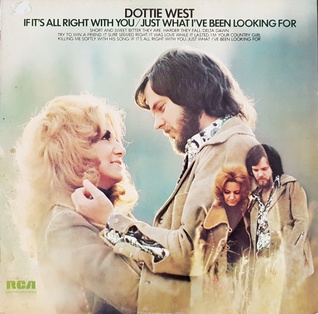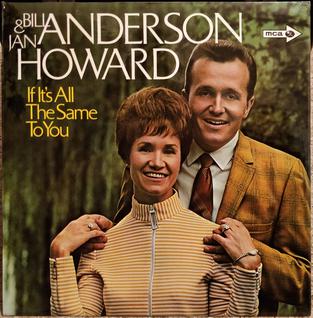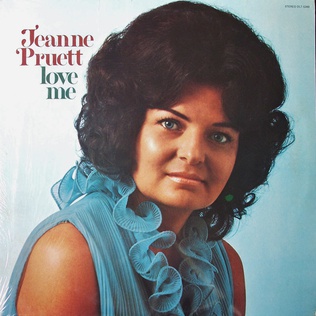
Donna Fargo is an American country singer-songwriter known for a series of Top 10 country hits in the 1970s. These include "The Happiest Girl In The Whole U.S.A." and "Funny Face", both of which were released in 1972 and became crossover pop hits that year.

Porter & Dolly is the thirteenth and final collaborative studio album by Porter Wagoner and Dolly Parton. It was released on August 4, 1980, by RCA Victor. The album is made up of previously unreleased material recorded during Wagoner and Parton's duet years (1967–76), with new studio overdubs. It was released as part of a settlement from legal action Wagoner took against Parton following her departure from his band and syndicated television series. Two singles were released from the album. "Making Plans" peaked at number two on the Billboard Hot Country Singles chart and "If You Go, I'll Follow You" peaked at number 12.

"Heartache Tonight" is a song written by Don Henley, Glenn Frey, Bob Seger and J. D. Souther, recorded by the Eagles and features Glenn Frey on lead vocals. The track was included on their album The Long Run and released as a single in 1979. It reached No. 1 on the U.S. Billboard Hot 100 in November of that year and was certified Platinum by the Recording Industry Association of America representing one million copies sold. It was the Eagles' final chart-topping song on the Hot 100.

"Tequila Sunrise" is a song from 1973, written by Don Henley and Glenn Frey, and recorded by the Eagles. It was the first single from the band's second album, Desperado. It peaked at number 64 on the Billboard Hot 100.

Let Me In is the third studio album by American country music artist Chely Wright. The album was released on September 9, 1997 on MCA Nashville Records and was produced by Tony Brown. Let Me In was Wright's first album to chart on the Billboard Magazine album charts and also spawned her first Top 40 singles. It was also the first of three albums Wright recorded for the MCA Nashville label.

Single White Female is the fourth studio album by American country music artist Chely Wright. The album was released on May 18, 1999, by MCA Nashville Records. It was produced by Tony Brown, Buddy Cannon, and Norro Wilson. The album was originally to be titled The Fire, but was re-titled to Single White Female when the title track was increasing on the charts.

Louisiana Woman, Mississippi Man is the third collaborative studio album by Conway Twitty and Loretta Lynn. It was released on July 9, 1973, by MCA Records.

No Nonsense is the twenty-second solo studio album by American country artist Barbara Mandrell. The album was released on August 21, 1990, on Capitol Records and was produced by Jimmy Bowen. It was the second studio album Mandrell released in 1990 as well as her third release for the Capitol label.

The Happiest Girl in the Whole U.S.A. is the debut studio album by American country artist Donna Fargo. The album was released in May 1972 on Dot Records and was produced by Fargo's husband and manager Stan Silver. The album's title track became Fargo's first major hit and a crossover Country pop hit, reaching #1 on the Billboard country chart and the Top 20 on the Billboard Hot 100. The second single entitled "Funny Face" had similar success the same year. The Happiest Girl in the Whole U.S.A. is Donna Fargo's highest-selling album in the United States.

My Second Album is the second studio album released by American country artist Donna Fargo. The album was released in February 1973 on Dot Records and was produced by Fargo's husband and manager Stan Silver. The album spawned two number one singles on the Billboard country chart and was one of two albums Donna Fargo would release in 1973.

Miss Donna Fargo is the fourth studio album released by American country artist Donna Fargo. The album was released in 1974 on Dot Records and was produced by Fargo's husband and manager Stan Silver. Unlike any of Fargo's previous releases, Miss Donna Fargo spawned three singles, all of which became Top 10 singles on the Billboard country chart, including "You Can't Be a Beacon If Your Light Don't Shine".

Whatever I Say Means I Love You is the fifth studio album released by American country artist Donna Fargo. The album was released in July 1975 on Dot Records and was produced by Stan Silver. It was Fargo's final album for the Dot label and produced four singles between 1975 and 1976 that each charted on the Billboard country music chart.

On the Move is the sixth studio album released by American country artist Donna Fargo. The album was released in 1976 on Warner Bros. Records and was produced by Fargo's husband and manager Stan Silver. It was Fargo's first album released on the Warner Bros. label, after recording five studio albums for Dot Records between 1972 and 1975.
"Lovin' Her Was Easier " is a song written, composed, first recorded, and first released by Kris Kristofferson. It was also recorded and released by Roger Miller, who included it on his album The Best of Roger Miller and released it as a single in July 1971. Ten years later, it was recorded by Tompall & the Glaser Brothers for the album Lovin' Her Was Easier.

"Do I Love You" is a song co-written and recorded by Paul Anka, from his 1972 eponymous LP. Released as an advance single in late 1971, "Do I Love You" reached number 14 on the Easy Listening Singles charts of both the U.S. and Canada, number 16 on the Canadian Pop chart, and was a modest hit on the U.S. Hot 100 as well. As with the earlier "My Way", it was adapted from a French-language song popularized by Claude François, and Anka composed the English lyrics.

"Can't You See" is a song written by Toy Caldwell of The Marshall Tucker Band. The song was originally recorded by the band on their 1973 debut album, The Marshall Tucker Band, and released as the album's first single. Record World called it "a strong rhythm item that continually builds and builds." A live version was released in 1977 and peaked at number 75 on the Billboard Hot 100. Cover versions of "Can't You See" have charted for Waylon Jennings and the Zac Brown Band with Kid Rock (2010).

If It's All Right with You/Just What I've Been Looking For is a studio album by American country music artist Dottie West. It was released in May 1973 on RCA Victor Records and was produced by Jerry Bradley. The project was West's 20th studio recording in her music career. It consisted of ten tracks, two of which became minor hits on the country charts in 1973. The album's contemporary sound helped modernize West's music, bringing the album to chart on the Billboard country albums survey in 1973.

If It's All the Same to You is a studio album by American country music artists Bill Anderson and Jan Howard. The album was released on Decca Records in March 1970 and was produced by Owen Bradley. It was the pair's second collaborative album after several years of performing together on tour and on television. The album's title track became a major hit on the Billboard country chart, reaching the top 10. Additionally, the album itself would reach peak positions on the Billboard country albums chart.

Love Me is a studio album by American country music artist Jeanne Pruett. It was released in October 1972 on Decca Records and was produced by Walter Haynes. Love Me was the debut studio recording in Pruett's music career and the first of several albums she issued with the Decca label. The album contained 11 tracks, four of which were released as a singles and became charting hits on the national country music charts.

Charley is the twentieth studio album by American country music artist Charley Pride. It was released in May 1975 via RCA Victor Records and was produced by Jack Clement. The record was Pride's twentieth studio album released in his career and contained a total of ten tracks. The album included two singles which became major hits that year on the country chart: "I Ain't All Bad" and "Hope You're Feelin' Me ."



















